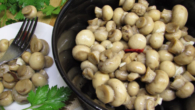
Experts told why you should add radish to your diet
0
While the season is still in full swing, experts from Baazar magazine told you why you should add radish to your diet and why it is important for your body.
A source of vitamins and minerals
Radish is one of the underrated superfoods. The root crop is rich in vitamin C (one cup of raw radish contains about 30% of the daily requirement), which the body needs for various purposes: from producing the youth protein collagen to protecting against viruses and pathogenic bacteria. In addition, radishes contain some B vitamins, potassium, calcium, magnesium, and iron.
Helps control blood sugar
Sharp changes in blood sugar levels have many unpleasant consequences for the body. The most harmless are increased appetite and, as a result, overeating, and later – the development of type 2 diabetes. Chemical compounds contained in radish prevent blood glucose spikes and regulate metabolic processes.
Rich in antioxidants
Antioxidants are our main helpers in the fight against chronic diseases and aging. They effectively fight oxidative processes and protect cells from damage by free radicals. Radish, along with other cruciferous vegetables, is rich in various antioxidant compounds, and they are contained not only in the root crop itself, but also in the leaves and seeds of the plant.
Dietary product
Radish is a low-calorie product. One cup of raw radish contains only 20 kcal, a lot of fiber and even a small amount of vegetable protein. It can be added to salads and sandwiches – the root crop will not only make them useful, but will also relieve you of hunger for a long time due to the high content of dietary fiber.
Strengthens immunity
A few centuries ago, people used raw radish with honey to treat various colds. The root crop is rich in glycosides – these substances not only give it a characteristic tart taste, but also provide reliable protection of the body against viruses and pathogenic bacteria. In addition to strong antimicrobial properties, radish strengthens the body's immune defenses well by storing vitamins and minerals: especially vitamin C, potassium, magnesium and manganese.









Leave a Reply